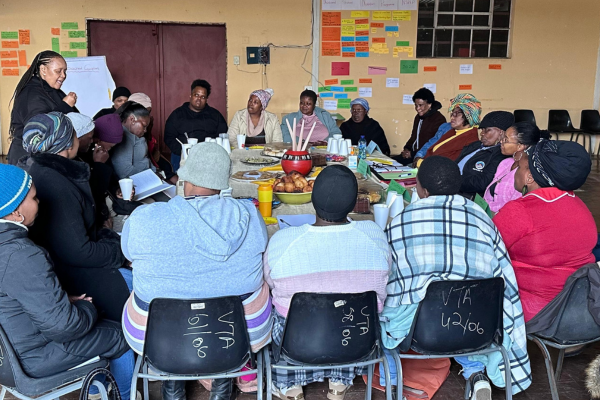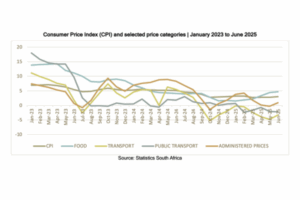Gauteng Volunteer Food Handlers strengthened their campaign by engaging in a roundtable discussion with experts on labour rights, organising, nutrition, and more.
Unpaid and underpaid care work sustains the economy and is increasingly in demand. Yet, patriarchal and neoliberal values persist, categorising care work as an extension of women’s ‘natural’ reproductive roles, contributing to its informalisation in the economy. Intersecting biases of gender, racism and classism deny women and girls who dominate informal jobs the labour rights and conditions needed to move out of poverty.
Public care work programmes under the Expanded Public Works Programme (EPWP), such as the National School Nutrition Programme (NSNP), Early Childhood Development (ECD), and Home-Based Care and Community Health Workers (HCBC) rely on the labour of women. These programmes, while vital, are often characterised by precarious working conditions, low remuneration, limited training, inadequate social protection measures, and unsafe working environments.
The EPWP, despite aiming to promote gender equality, has reinforced gendered inequalities, leaving care workers undervalued, underpaid, and insecure. Transforming public care requires improving the conditions of care workers. Adequate government resources and support are essential to building a society that values women’s work.
Care work must be recognised, reduced, redistributed, rewarded, and represented in line with the ILO 5Rs framework.
In partnership with the Sage Fund, LRS is taking an innovative approach by prioritising the voices and agency of women care workers in challenging the existing notions and conditions. Through its Decent Work: Transforming Public Care Work Programmes in South Africa initiative, LRS unites three groups of care workers in the EPWP, all essential to the economy and facing similar challenges:
- South African Care Workers Forum: Organises Home-Based Care and Community Health workers.
- South African Democratic Teachers Union: A union of educators organising Early Childhood Educators.
- Concerned Volunteer Food Handler Committee of Gauteng: A group of Volunteer Food Handlers advocating for better conditions.
Through a feminist pedagogical approach and safe, creative spaces, LRS will support women to elevate care work and ensure recognition by the government of its value through policies and care work programmes while supporting care worker organisations to improve conditions and wages, and challenging gendered perceptions of care work.
This approach, grounded in feminist pedagogy for labour rights activism, moves away from hierarchical teaching models toward shared knowledge-building. The initiative is informed by an intersectional analysis of anti-oppression, recognising the multiple identities and inequalities that shape care workers’ experiences.
The initiative aims for care work in the EPWP to be recognised and valued as decent work and for Government care policies and programmes to promote a more just redistribution of the responsibility of care work between the state, employers, and men. Such shifts are urgently needed for women’s rights, social cohesion, and solidarity in a time of increased food insecurity and gender-based violence.
The initiative builds on LRS’s support of a group of Volunteer Food Handlers in Gauteng who have been advocating for recognition and rights as workers under the NSNP for the past three years. Their advocacy saw improved contracts, stipend increases, access to UIF and diverse allies, and increased awareness of their important role in the school nutrition programme.
How EPWP is organised
The EPWP is divided into four sectors, with the social sector serving as the care sector. These include work opportunities in Early Childhood Development, Home-Based Care and Community Health, and the National School Nutrition Programme. Women make up more than 80% of the workforce across these programmes. However, only one-third of care workers are directly paid through the EPWP, while others receive stipends or salaries through various funding channels, including government departments, NGOs, and the private sector.
These fragmented funding arrangements result in inconsistent wages, with many workers earning below the EPWP ministerial determination and the 2025 minimum wage of R15.83 per hour. Some are considered volunteers rather than workers, denying them access to labour protections under the Labour Relations Act and BCEA.
Policy incoherence and lack of enforcement further devalue care work. EPWP care workers earn less than their counterparts in male-dominated sectors such as infrastructure. While the minimum wage policy aimed to address the disparity, poor governance, lack of government commitment, and low unionisation have left these women workers vulnerable. The situation is worsening, as EPWP Phase Five shifts focus to road maintenance, energy, and cleaning government buildings, excluding care work. Meanwhile, budget cuts in education threaten the ECD and NSNP programmes, further destabilising care work.
The objectives of the LRS initiative
Support women care workers in voicing their struggles and insights as workers, activists, mothers, and breadwinners to generate evidence and solutions. Using LRS’ innovative feminist pedagogical approach to labour rights activism, create safe and creative spaces for women care workers to develop change projects that build solidarity and collective actions for decent care work opportunities and empowerment.
Strengthen meso-level multi-stakeholder coalition focused on critical-consciousness raising and organising among women care workers. Through stakeholder coalition building, we are aiming to improve collective impacts that will generate improvements in the reduction and redistribution of unpaid care work. This includes integrating multimedia and communication skills-building among care workers and their allies to create advocacy material that raises awareness and mobilises stakeholders for improved work conditions and labour rights recognition at municipal, provincial, national and international levels.
Build public awareness and support for women care workers through social dialogue, education, and collective bargaining engaging trade unions, government, and civil society.
Explore an experimental approach with the Commission for Gender Equality, feminist economic experts, and women care worker leaders to pilot and test a feminist economic analysis of national budgeting to departments of social development, health and education; and gender-responsive budget analysis of one or more of the government-care work programs as further advocacy material to challenge policymakers.
LRS approach
We will use participatory action research and feminist reflexive research practices to explore how, why, for whom, and under what conditions actions impact change.
We will support Volunteer Food Handlers, Home-Based Care and Community Health Workers, and Early Childhood Educators in a convergence to establish a national platform to challenge the perception of care work as women’s responsibility and, therefore, not worthy of recognition as decent work.
The convergence is a dynamic and inclusive space that fosters dialogue, challenges traditional power structures, and encourages intersectional collaboration. It will serve as a collective meeting ground for care workers to tell their stories, exchange ideas and co-create strategies.
The platform is a movement driven by care workers, aiming to transform how care work is perceived and valued. It seeks to unite care workers as whole individuals, engaging Head, Heart, and Hands. The platform will articulate shared goals and foster a sense of sisterhood built on common experiences and struggles. A key focus is cultivating belonging beyond organisational structures.
Each group of care workers brings sector-specific expertise in organising, mobilising, and advocating for improved work conditions and remuneration. The organisations have an in-depth understanding of policies affecting their sectors and the challenges related to implementation.
LRS will support individual and collective valuing of the care workers and increase the engagement, political will, and actions among implementers of the EPWP care programmes through advocacy and social dialogue.
Using gender-responsive budget analysis
Building on our experience, we will facilitate the direct engagement of care workers with national budget processes. In 2024, we supported food handlers in responding to the President’s State of the Nation and budget speeches, culminating in a joint opinion piece with Section 27, and part of a petition by Amandla.mobi. Similarly, care workers from the three organisations will actively analyse the budget, ensuring their perspectives inform expert-driven responses.
A key strategy involves participatory knowledge-sharing, modelled on our roundtable approach where care workers engaged experts as “books”, posing critical questions on labour rights, nutrition, and social policy. This method strengthens workers’ understanding and capacity to challenge budget decisions. By amplifying their voices through media, public campaigns, and policy dialogues, we aim to push for increased investment in care work, improved wages, and strengthened labour protections. The project will also use gender budgeting frameworks to assess the potential of Public Employment Programmes (PEP) in promoting employment and decent work.
Possible additional changes if the EPWP fully recognises care work as decent work
Recognising EPWP care work as decent work would trigger broader policy shifts across government policies, agencies, and the care economy.
- Adherence to the existing Ministerial Determination and minimum wage would affirm care workers as employees rather than volunteers. This would require widespread mobilisation and legal action to uphold minimum standards.
- Ensuring all EPWP care workers, whether funded directly or indirectly, receive the national minimum wage of R28.79 (2025) per hour. A precedent exists: Domestic workers, previously excluded, are now covered under the national minimum wage due to persistent advocacy.
- Government action to uphold social protections, such as unemployment insurance and occupational health and safety standards, will be key indicators of the recognition, valuing, and promotion of decent work for care workers.
- Recognising care work as formal employment would elevate its visibility in public discourse, highlighting its role in social cohesion and economic development. Even within mainstream economic frameworks, research supports investing in the care economy. Studies indicate that increasing public spending on care by one percentage point (as a ratio of GDP) per year for five years would boost GDP by 6.9% and total employment by 8.8%—creating jobs for both women (14%) and men (4.7%), leading to a 3.1% rise in overall employment rates.
The LRS Decent Work: Transforming Public Care Work Programmes in South Africa initiative is supported by the SAGE Fund.

RELATED ARTICLES
Valuing care work: What are the prospects for women in the National School Nutrition Programme?
Building a campaign to recognise and value the work of Volunteer Food Handlers
- Healthcare workers are at risk in a society that does not value the work of caring
- The Story of Letsema – A collective impact initiative for addressing GBV in the Vaal.







